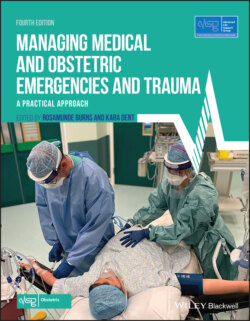Читать книгу Managing Medical and Obstetric Emergencies and Trauma - Группа авторов - Страница 113
Increase in heart rate
ОглавлениеAn increase in the heart rate occurs in compensation for hypovolaemia (1000–1500 ml blood loss) or vasodilatation, both of which can cause hypotension and shock. A maternal heart rate of more than 100 beats/min should be considered sinister, until proven otherwise. Most, but not all, women will become tachycardic if bleeding significantly, but paradoxical bradycardia also occurs. Vagal stimulation caused by cervical stimulation (e.g. products in the os) or peritoneal irritation can produce bradycardia profound enough to cause shock. Medications such a beta‐blockers and labetalol (alpha‐ and beta‐blocker) will prevent a tachycardic response to hypovolaemia and this may be falsely reassuring in the assessment of the bleeding patient.
